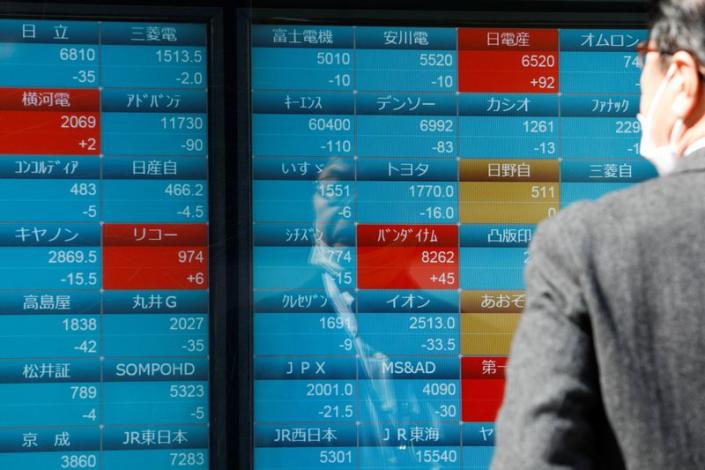Asian stocks were a mixed bag on Wednesday with China’s indexes still benefiting from the optimism over Beijing’s market rescue efforts, while elsewhere many investors stayed on the sidelines waiting to see if more was to come to aid the world’s No2 economy.
In recent days, China’s regulators have announced further curbs on short selling and state investors said they were also expanding their stock buying plans.
That saw China stocks extend their rally, as investors bet on more powerful market rescue measures being rolled out after Chinese stocks plunged to five-year lows last week.
Also on AF: China’s Cheap Solar Panels Killing Europe’s Solar Manufacturers
The blue-chip CSI 300 Index rose 0.96%, while the Shanghai Composite Index grew 1.44%, or 40.21 points, to close at 2,829.70. The Shenzhen Composite Index on China’s second exchange gained 1.47%, or 22.12 points, to 1,528.91.
Hong Kong shares seesawed throughout the session and ended the day slightly lower, with Chinese tech firms listed in the territory retreating 0.8% after a 7% rally on Tuesday.
The Hang Seng Index fell 0.34%, or 54.98 points, to 16,081.89, and the Hang Seng China Enterprises Index lost 0.95%.
Japan’s Nikkei share average traded lower, dragged by heavyweight technology stocks, although sharp gains in Toyota Motor and Mitsubishi Corp stocks after the companies announced robust outlook and shareholder returns capped losses.
The Nikkei share average edged down 0.11%, or 40.74 points, to close at 36,119.92, while the broader Topix was ahead 0.42%, or 10.70 points, to 2,549.95.
Toyota Motor climbed 4.69% after the automaker raised its full-year operating profit forecast by nearly 9%. Auto and auto parts makers jumped 3.64% to become the best performer among the Tokyo Stock Exchange’s 33 industry sub-indexes.
Elsewhere across the region, in earlier trade, there were also gains in Sydney, Seoul, Singapore, Mumbai, Bangkok, Wellington, Manila and Jakarta. MSCI’s broadest index of Asia-Pacific shares outside Japan gained 0.4% to a five-week top.
US Rate Cuts Impatience
All three Wall Street major indexes rose overnight but the tech-heavy Nasdaq inched up only 0.07%, with the Philadelphia SE Semiconductor index ending down 1.14%.
EUROSTOXX 50 futures and FTSE futures both added 0.1%. S&P 500 futures and Nasdaq futures were trading near flat.
Companies reporting earnings on Wednesday include Uber, Walt Disney and PayPal.
The banking sector remained a concern as Moody’s downgraded New York Community Bancorp to junk citing pressure on its funding and liquidity. The stock lost 22% on Tuesday, to be down 60% since it reported surprise losses last week.
The timing of US rate cuts was no clearer after Federal Reserve Presidents Loretta Mester and Neel Kashkari welcomed the progress on inflation but signalled there was more work to do before policy could be eased.
Fed Philadelphia President Patrick Harker was more upbeat on achieving an economic soft landing and noted they were making “real progress” on inflation.
Further guidance will come later Wednesday as Fed speakers include Governors Adriana Kugler and Michelle Bowman, along with Presidents Thomas Barkin and Susan Collins.
US Dollar Eases
Fed fund futures still found buyers on Tuesday after two sessions of sharp falls, and the market essentially added 8 basis points of cuts back in for 2024.
The probability of a cut as early as May now stands at just 39%, when it was considered a done deal just a week ago, while the chance of a quarter-point move in June remains at 100%.
Futures imply around 122 basis points of easing for all of 2024, down from 145 basis points late last week.
Treasuries also bounced as a sale of three-year paper drew solid demand, and 10-year yields dipped to 4.086% from Monday’s top of 4.177%.
The drop in yields took some steam out of the US dollar which eased to 147.85 yen and away from the recent 10-week peak of 148.90.
The dip in the dollar helped gold steady at $2,035 an ounce, having been as low as $2,013.70 early in the week.
Oil prices found support from a US Energy Department assessment that US output would grow by only 170,000 barrels per day (bpd) this year, instead of a previously forecasted pace of 290,000 bpd.
Brent rose 18 cents to $78.77 a barrel, while US crude edged up 21 cents to $73.52 per barrel.
Key figures
Tokyo – Nikkei 225 < DOWN 0.11% at 36,119.92 (close)
Hong Kong – Hang Seng Index < DOWN 0.34% at 16,081.89 (close)
Shanghai – Composite > UP 1.44% at 2,829.70 (close)
London – FTSE 100 < DOWN 0.23% at 7,663.25 (0936 GMT)
New York – Dow > UP 0.37% at 38,521.36 (Tuesday close)
- Reuters with additional editing by Sean O’Meara
Read more:
China’s Small Exporters Being Crushed by Falling Prices
Investors Exiting China Flock to India Despite Overheating Risk
Brokers in China Seen Restricting Cross-Border Stock Trades
China, Hong Kong Stocks Surge on Policy Boosts; Nikkei Slips
























